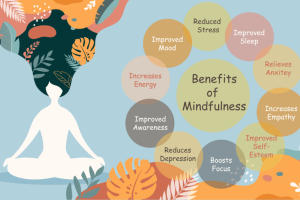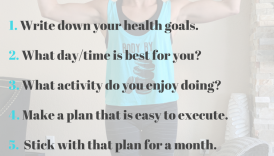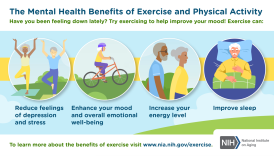Nurturing Your Body and Mind: The Importance of a Healthy Living Foundation

Understanding the Connection Between Body and Mind
The intricate dance between body and mind is a captivating subject, often overlooked in our fast-paced lives. Imagine for a moment how a simple workout can lift your mood or how stress can manifest as physical pain. This connection is vital for overall wellness.
- Nurturing Your Body and Mind: The Importance of a Healthy Living Foundation
- Understanding the Connection Between Body and Mind
- Benefits of a Healthy Living Foundation
- Improved Physical Health
- Enhanced Mental Well-being
- Establishing a Nutritious Diet
- Key Components of a Nutritious Diet
- Importance of Regular Exercise
- Physical Health Benefits
- Mental Health Benefits
- Quality Sleep for Overall Wellness
- Why Quality Sleep Matters
- Managing Stress for Mind-Body Balance
- Strategies to Manage Stress
- Building Healthy Relationships for Emotional Support
- Importance of Family and Social Connections
- Incorporating Mindfulness and Meditation Practices
- Benefits of Mindfulness and Meditation
- Balancing Work and Leisure Activities
- Strategies for Achieving Balance
- Exploring Holistic Health Approaches
- Key Holistic Practices to Consider
- Seeking Professional Help When Needed
- When to Seek Professional Help
- Implementing Self-care Routines
- Essential Elements of a Self-care Routine
- Setting Realistic Health Goals
- Tips for Setting Effective Health Goals
- Celebrating Achievements and Progress
- Ways to Celebrate Your Successes
- Conclusion
- The Path Forward
- Mind-body relationship: Our emotional state directly influences physical health.
- Stress impact: Anxiety can lead to muscle tension and fatigue.
- Exercise benefits: Engaging in regular activity can enhance mental clarity and emotional stability.
By acknowledging this synergy, individuals can make conscious choices to establish a healthy living foundation that nurtures both aspects, setting the stage for a fulfilling life.
Benefits of a Healthy Living Foundation
Improved Physical Health
Building a healthy living foundation significantly enhances physical health. When individuals prioritize nutrition, exercise, and proper rest, they often experience:
- Increased stamina: Regular physical activity boosts energy levels.
- Stronger immune system: A balanced diet supports immune function.
- Weight management: Healthy habits contribute to maintaining a healthy weight.
For instance, when Sarah integrated more vegetables and fruits into her diet, she noticed a significant drop in her frequent colds.
Enhanced Mental Well-being
In addition to the physical benefits, an emphasis on healthy living profoundly impacts mental well-being. Vital improvements include:
- Reduced anxiety levels: Physical activity releases endorphins that combat stress.
- Better mood regulation: A nutritious diet can stabilize emotions.
For example, Mike found that his mood improved dramatically since he made time for daily walks, highlighting how interconnected our choices are. By adopting these lifestyle changes, individuals can cultivate a thriving psychological state, reinforcing the importance of a holistic approach to health.
Establishing a Nutritious Diet
Transitioning to a nutritious diet is a fundamental step toward enhancing both physical health and mental well-being. It can seem daunting at first, but with some simple strategies, anyone can make meaningful changes.
Key Components of a Nutritious Diet
Focusing on the following components can make a significant difference:
- Whole foods: Include fruits, vegetables, whole grains, and lean proteins.
- Hydration: Drinking plenty of water supports bodily functions and mental clarity.
- Balanced plates: Aim for a mix of macronutrients (carbs, protein, fats) in every meal.
For example, when Maria decided to replace processed snacks with fresh fruits, she felt more energized throughout the day. By establishing a nutritious diet filled with whole foods and mindful choices, individuals can unlock higher energy levels and improved overall health, paving the way for a vibrant lifestyle.
Importance of Regular Exercise
Having established a nutritious diet, the next crucial aspect of a healthy living foundation is regular exercise. Engaging in physical activity regularly is essential for overall well-being and brings a wealth of benefits.
Physical Health Benefits
The advantages of regular exercise on physical health include:
- Improved cardiovascular fitness: Enhances heart health and circulation.
- Weight management: Helps maintain a healthy weight.
- Stronger muscles and bones: Strength training promotes bone density.
For instance, after Jake committed to a consistent workout routine, he noticed not only drastic physical improvements but also a surge in energy and vitality.
Mental Health Benefits
Beyond the physical perks, exercise is a powerful tool for mental health:
- Stress reduction: Physical activity can significantly lower stress levels.
- Elevated mood: Release of endorphins leads to feelings of happiness.
- Better focus and productivity: Regular movement sharpens concentration and clarity.
When Emily began incorporating daily jogs into her life, she discovered a newfound sense of calm and clarity, affirming how exercise fosters balance in both body and mind. By prioritizing regular exercise, individuals lay the groundwork for a healthier, happier life.
Quality Sleep for Overall Wellness
As we transition from the importance of regular exercise, another vital element of a healthy lifestyle is quality sleep. Many people underestimate its significance, yet restful sleep is essential for both physical and mental health.
Why Quality Sleep Matters
Benefits of prioritizing quality sleep include:
- Enhanced cognitive function: Sleep plays a crucial role in memory consolidation.
- Physical recovery: Rest supports muscle repair and immune function.
- Mood regulation: A good night’s sleep can significantly improve emotional stability.
For example, when Lisa began setting a regular bedtime routine, she noticed increased productivity and a brighter mood throughout the day. By emphasizing quality sleep as part of a healthy living foundation, individuals can unlock a wealth of benefits, fostering resilience and vitality in their everyday lives.
Managing Stress for Mind-Body Balance
Following the discussion on quality sleep, managing stress is equally crucial for achieving mind-body balance. Stress can easily disrupt the harmony between mental and physical health, making it vital to adopt effective stress management techniques.
Strategies to Manage Stress
Consider incorporating the following practices into your routine:
- Mindfulness meditation: Focuses awareness on the present moment, reducing anxiety.
- Breathing exercises: Simple deep-breathing techniques can quickly calm the mind.
- Regular physical activity: Exercise serves as a powerful stress reliever.
For instance, after implementing daily mindfulness sessions, Tom experienced a noticeable reduction in stress and improved focus. Embracing these strategies enables individuals to cultivate a sense of balance, enhancing overall wellness and resilience in the face of life’s challenges.
Building Healthy Relationships for Emotional Support
Continuing from the importance of managing stress, another significant aspect of overall wellness is establishing healthy relationships. Emotional support from family and friends can be a powerful antidote to life’s challenges.
Importance of Family and Social Connections
Fostering strong relationships benefits emotional health in several ways:
- Increased resilience: Supportive connections buffer against stress and adversity.
- Improved mental health: Strong relationships can reduce feelings of loneliness and isolation.
- Enhanced happiness: Time spent with loved ones often boosts mood and satisfaction.
For example, after reconnecting with her childhood friends, Jessica found a new sense of joy and community, affirming how meaningful relationships can enrich one’s life. By prioritizing family and social connections, individuals cultivate a support network that promotes emotional well-being and a balanced life.
Incorporating Mindfulness and Meditation Practices
As we explore the value of healthy relationships, it’s essential to recognize how incorporating mindfulness and meditation can enhance emotional support and overall well-being. These practices help individuals cultivate a more profound connection with themselves and their surroundings.
Benefits of Mindfulness and Meditation
Engaging in mindfulness and meditation offers numerous advantages:
- Increased self-awareness: Helps recognize thought patterns and emotions.
- Stress reduction: Fosters a tranquil mind, reducing anxiety levels.
- Enhanced focus: Improves concentration and mental clarity.
For instance, when David integrated five minutes of meditation into his morning routine, he felt more centered and less reactive throughout the day. By making mindfulness and meditation regular practices, individuals can create a peaceful inner space that complements the emotional support obtained from relationships, leading to a more balanced and fulfilling life.
Balancing Work and Leisure Activities
Building on the mindfulness practices that enhance emotional support, finding a balance between work and leisure is crucial for maintaining overall wellness. With the demands of daily life, it’s easy to let work consume precious free time, but prioritizing leisure activities is essential for a healthy mind and body.
Strategies for Achieving Balance
Consider these strategies to help balance work and leisure:
- Schedule leisure time: Block out time in your calendar for hobbies and relaxation.
- Set boundaries: Establish clear work hours to avoid burnout.
- Engage in enjoyable activities: Choose activities that bring you joy, whether it’s reading, gardening, or spending time with friends.
For example, when Sarah started setting aside Sunday as her “do-nothing” day, she found herself recharged and more productive the following week. By consciously balancing work and leisure, individuals can foster creativity, improve mental health, and achieve greater fulfillment in both personal and professional spheres.
Exploring Holistic Health Approaches
As we delve into the importance of balancing work and leisure, it’s also essential to consider holistic health approaches that nurture the body, mind, and spirit. These approaches recognize the interconnectedness of various aspects of health and empower individuals to take control of their overall well-being.
Key Holistic Practices to Consider
Here are some holistic practices that can enhance your wellness journey:
- Nutrition-focused lifestyle: Pay attention to what you eat, prioritizing whole foods and natural ingredients.
- Complementary therapies: Explore acupuncture, chiropractic care, or aromatherapy.
- Mind-body practices: Incorporate yoga or tai chi to harmonize physical movement with breath.
For instance, after participating in a community yoga class, Rachel discovered improved flexibility and reduced stress levels, illustrating the profound impact of holistic approaches. By embracing holistic health methods, individuals can create a comprehensive wellness plan that not only addresses physical ailments but also fosters emotional and spiritual growth.
Seeking Professional Help When Needed
Building on the exploration of holistic health approaches, it’s crucial to recognize the importance of seeking professional help when necessary. No one should navigate health challenges alone, and reaching out for assistance is a sign of strength, not weakness.
When to Seek Professional Help
Consider seeking professional help in the following situations:
- Persistent stress or anxiety: If you find it hard to cope day-to-day, a therapist can provide valuable strategies.
- Chronic health issues: Consulting with healthcare providers can offer solutions tailored to your needs.
- Nutritional concerns: A registered dietitian can help create a balanced eating plan.
For example, when Mark realized that his stress was affecting his work and relationships, he sought counseling, which helped him develop coping mechanisms. By understanding when to seek professional assistance, individuals can effectively address their concerns while enhancing their overall well-being, reaffirming that support systems are readily available for those in need.
Implementing Self-care Routines
Continuing from the importance of seeking professional help, implementing self-care routines is another vital component of overall wellness. Self-care is about prioritizing your needs and making time for activities that replenish your energy and happiness.
Essential Elements of a Self-care Routine
Consider incorporating the following elements into your self-care routine:
- Regular check-ins: Take time to assess your emotional and physical state.
- Healthy boundaries: Learn to say no to prevent overwhelm and burnout.
- Engaging in hobbies: Dedicate time to activities that bring you joy, like painting or hiking.
For instance, after starting a weekly spa night at home, Claire found new ways to unwind, illustrating how small changes can lead to significant improvements in well-being. By implementing consistent self-care routines, individuals can cultivate a balanced lifestyle and enhance their resilience against daily stressors.
Setting Realistic Health Goals
Following the incorporation of self-care routines, setting realistic health goals becomes essential for sustained progress and motivation. Clear, achievable goals help individuals stay focused and foster a sense of accomplishment.
Tips for Setting Effective Health Goals
Here are some strategies to create realistic health goals:
- Be specific: Instead of “eat healthier,” aim for “include three servings of vegetables daily.”
- Make it measurable: Use quantifiable metrics, such as exercising for 30 minutes a day three times a week.
- Set a timeline: Establish deadlines to provide structure, like “reduce sugar intake over the next month.”
For example, when Jake committed to swim twice weekly instead of aiming for daily workouts, he found it more manageable and enjoyable. By setting realistic health goals, individuals can create a positive path forward, celebrating small victories and maintaining long-term motivation on their wellness journey.
Celebrating Achievements and Progress
As we continue from setting realistic health goals, it’s essential to celebrate achievements and progress along the way. Acknowledging accomplishments, no matter how small, is crucial for motivation and reinforces positive behaviors in your wellness journey.
Ways to Celebrate Your Successes
Here are some creative ideas for celebrating your milestones:
- Treat yourself: Reward yourself with something special, like a massage or a new book.
- Share your success: Celebrate with friends and family to create a supportive community.
- Reflect on your journey: Take time to journal about what you’ve learned and how far you’ve come.
For example, after completing her first month of regular workouts, Anna treated herself to a weekend getaway, which reinforced her commitment. By regularly celebrating achievements and progress, individuals create a positive cycle of motivation and fulfillment, fostering a deeper connection to their health and wellness goals.
Conclusion
In conclusion, navigating the journey to health and wellness involves multiple interconnected factors, from setting realistic health goals to celebrating achievements along the way. Each step—whether it’s prioritizing self-care routines, managing stress, or fostering healthy relationships—contributes to a balanced and fulfilling life.
The Path Forward
To summarize the key takeaways:
- Holistic approach: Embrace a comprehensive view of well-being that includes physical, mental, and emotional aspects.
- Seek balance: Strive to find harmony between work, leisure, and personal health.
- Practice celebration: Regularly acknowledge your progress to stay motivated.
For instance, reflecting on her journey, Rachel felt empowered as she embraced her wellness routine, illustrating that small steps can lead to significant change. By consistently applying these principles, individuals can cultivate a sustainable lifestyle that promotes lasting health and happiness.





